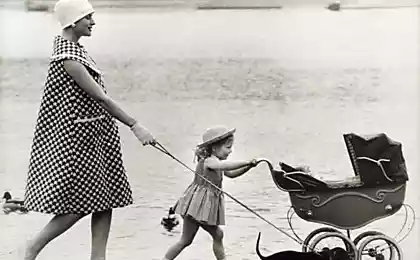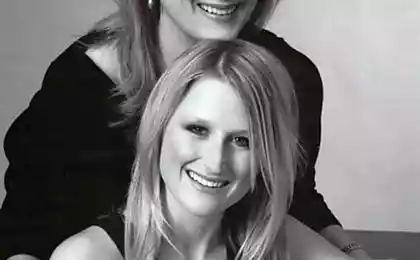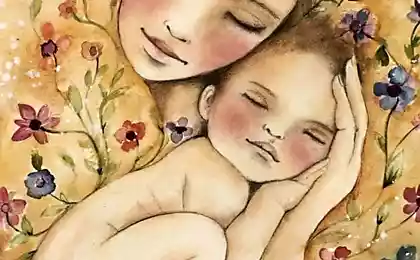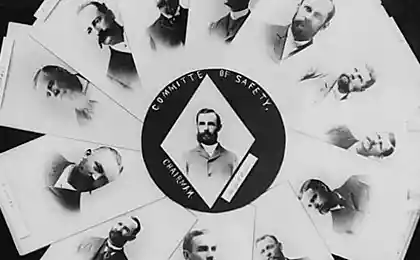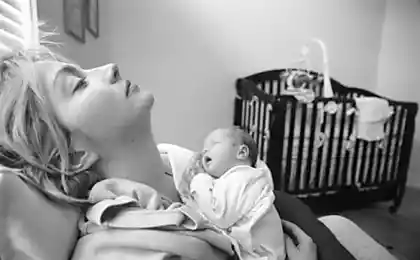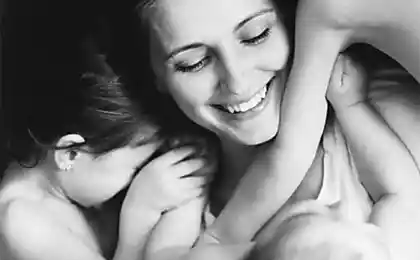938
Mother to all, and she was one
Let's talk about discrimination. Using as information about the most significant public discussion recently about "maternal responsibilities" (cases Kate Middleton, Alla Pugacheva, spouses Shuhevych and "pussy rayot"), I would like to invite readers/nits to thinking about how to develop social circumstances in which any mother, whoever did this work, it becomes extremely vulnerable.
My starting point will be to direct the following questions: who, from the point of view of popular imagination, perhaps and who need not be a mother, what are the criteria of a "good mother" and who in the current climate, they can be the same as the maternal myth is correlated with the actual practices of child care and how fabricated the traditional gender division of society that gives some people the responsibility, and the other exempt from it.
If the mother is a Princess
Thirty five million eight hundred ninety four thousand five hundred twenty one
Photo by Michael Middleton — WPA Pool/Getty Madev July 2013 world press enthusiastically discussed the events surrounding the birth of Prince George son of Duke and Duchess of Cambridge. In the Russian media paid particular attention to two circumstances — the appearance of the Princess and her motherly tactics.
Who had become a "style icon" Kate Middleton appeared on the porch of the hospital, do not hide changes that occurred with her allowed the burden of the body, unlike many celebrities, among whom it is customary to demonstrate the wonders of getting in shape in record time. Mothers of the upper strata of society, whose services the army of professionals and unlimited possibilities, set impossible standards of appearance. In this context, the openness of the Duchess was perceived as courage and caused mostly gratitude.
However, the audience immediately found a reason for criticism. More than other issues the public was concerned, why the new-born Prince was carried to the journalists without a cap. Debate on the "Royal negligence" on the pages of Newspapers lasted a few days. Needless to say that the responsibility for the health of the future king of the UK Internet rumor delegated his mother, ignoring the presence of the father's family?
"Mother, regardless of her social status, so vulnerable and undervalued that any Internet commenter automatically gets the power of the expert if you wish to criticize or lecture»
This mediashout demonstrates that in our days the expert position is not owned by the mother providing the care. Mother never knows better than others how to raise their children.
If the mother is in a wheelchair
Sixty five million eight hundred thirty six thousand thirty six
Anatoly and Svetlana Shugaeva with rebenkom August of the same year a new event from the category of "parent" has attracted wide attention. This time they discussed the story of a couple from the Crimea — Svetlana and Anatoly Shuhevych, whose newborn daughter was taken away by social services, explaining the decision by the fact that both parents live with cerebral palsy. Shuhevych the couple appealed to the media for support. And I must say, many who participated in the online discussions was on their side. However, the officials were not going to surrender. Their main argument was the fact that in geriatric boarding house, where the family lives, there are no conditions to take care of babies.
In addition sympathy to the parents, with tears in his eyes talking to telephoto lenses, "We can care for daughter, we will help our friends. We just want to see people, not animals," this is the story about a modern mother has no right to be who she is.
"If the mother, in this case, the parents, does not meet the main intention of social policy is to reduce public expenditure related to the organization of care for those who need it — the government will soon deprive these people of parenthood than will be to create the conditions necessary to sustain a family"
Post-Soviet politics of social security shall inherit the Soviet approach, which seeks to put vulnerable members of society in a variety of institutions, not considering the possibility of their socialization. In our time there are some progress in changing perceptions about whether all people should have equal access to public goods. However, these processes are extremely slow, and the new conditions under the suspicious eye of the authorities in addition to parents with disabilities get parents with low income, living outside of traditional marriage, beliefs that alternative "General course".
The arguments in favor of the removal of a child from a family can not be any "special needs" or "limited opportunities" for people living with disabilities.
"The materials for those involved in the care of young children, the current situation is automatically faced with disabilities and special needs, given the urban environment, not adapted to move with prams, and the labor market, are not sensitive to the problems of people with family responsibilities»
As a result of "rational economy" a large part of society is excluded from various spheres of life. The value of human life in such a philosophy is determined by the minimum of support he or she needs, and his or her productivity. The removal of children from families instead of providing the necessary assistance strengthens social order in which motherhood is the "duty" of women, but the organization of barrier-free in a broad sense environment is not the responsibility of society.
If mother diva
Fifty five million two hundred twenty thousand three hundred thirty six
Twocent 2013 another loud "parent" mediasystem was the appearance of children in the family of Alla Pugacheva and Maxim Galkin. In countless talk-shows and Internet publications mainly discussed two aspects of this event — the age of the pop diva and the script parenthood, who chose the spouse, using the services of a surrogate mother.
Many critics accused hypnotherapy in egoism, explaining its position that the prima Donna, because the retirement age will not be able to properly take care of the children. This thesis contains two important themes that allows you to control almost any mother: the complete denial of the role of other family members in the care of children and the blurring of the concept of "due care", with the result that any parent strategy can be seen as "not responsible enough".
In addition agitka reviews the case of Galkin and Pugacheva opened a debate on bioethics. However, not in the context in which one would expect. Surrogacy was not discussed as a reflection of class segregation, in which wealthy women rent the bodies of women financially vulnerable. It mostly was about domestic morality, which ascribes the crucial importance of biological kinship excludes from the focus on the importance of the labor associated with care.
Criticizing the choice of Alla Pugacheva, some commentators explained its decision "satiety". In this regard, it is appropriate to recall the state measures to increase the birth rate in force in Russia and Belarus and encouraging parents prospect of obtaining social housing. It is unclear why this logic the appearance of the child, dictated by need, defined as more "noble" than the desire to share resources when they are abundant.
Many statements was the fact that the artistic pair instead of turning to reproductive technology ought to take care of children deprived of parental care. Of these children, as we know from previous history, become social orphans against the wishes of their moms and dads. But the target of critics in this case are the "moral qualities" of the individual, not the social order. The opportunity to give a public estimate to reproductive choices and to impose certain scenarios in our time is not considered rude invasion of private space and serves as a measure of ideological control.
"It would seem that if the main task of the authorities in the context of reproduction — promoting fertility in order to replenish the army future taxpayers/d and the maximum delegation of care for children in private hands, the importance of the process of conception and degree of relationship of family members?"
The answer to this question rests on the problem of reconciling employment and family responsibilities.
Post-Soviet conservative design of social policy is based on the idea that taking care of the household — the main meaning of life of women, while employment is depicted as optional. But in our part of the world most families can't afford any commercial assistance or survive on one salary. Thus, the parent ideology (the same ideology of "traditional values") actually assigns women the double burden "given the nature of the necessity."
If mother and political activist
One million three hundred thirty nine thousand one hundred fourteen
Nthose one "parent" media event, which I would like to mention, is connected with the liberation of Nadezhda Tolokonnikova and Maria alyekhina from prison. Journalists, first received the opportunity to ask the participants of "pussy rayot" your questions, and bloggers, among whom were many famous people in the first place cared why, when released, women did not go to his children, and decided to meet each other to discuss joint plans associated with political activism.
Such claims assume that motherhood is the primary, natural and essential identity of women. Interestingly, some of the statements in this vein contemporaries) are public figures who show commitment to their professions, b) are not mothers. From this fact it follows that the standard of sacrificial motherhood, many are more willing to delegate to others than the parts themselves.
Of course, in connection with the release of "PR" it was not about children, and about the public image of women. More precisely, about how to design their "positive image", which wouldn't disturb the "public consciousness".
"Commenting cared not what actually happens with the children of Tolokonnikova and Alekhine, not the feelings of former prisoners. They were concerned about the absence of the expected maternal performance"
At sight of the completely past the notion of solidarity, which it would be appropriate to recall the context of what "pussy Riot" in jail for political protest.
Solidarity that is so lacking in the public debate, in which women themselves support the rhetoric of double standards. In our days children are "enemies" of mothers. Children are frightened, their interests justify any discriminatory actions. Children cease to be equal, they are assigned to a frightening symbol of the "our future", which is unclear when and who comes, but who needs to sacrifice the present.
Children are endowed with a false identity by analogy with a Victorian fotopribor "Invisible mother", in which holding the baby the mother was covered with a cloak. For anybody not a secret that children cannot "exist by themselves", but hiding behind a veil of maternal work, we continue to believe that the interests of the child can be considered separately from the interests of adults are concerned about it.
Six million three hundred thirty seven thousand one hundred seventy
The phenomenon of Hidden mothers in Victorian fotografiyami a public place may be a mother in the current system there is always what to blame. Media don't want to tell the stories of "ordinary" mothers. Maternal weekdays and the price is maternal labor — topics that are too close to the injustice of the social order.
"Public "exposing" the "bad mother" is always controversial, and therefore attractive to pop-culture character, while the image of "a few bad father" is the norm»
School, relatives, neighbors and friends are rarely held accountable for the well-being of children. Modern mother "all must", and she did not have one.
Who is "a good mother?"The modern ideology of motherhood relies on the Cartesian philosophical tradition, in which male function is associated with the spirit, intelligence and culture, and the female body, reproduction and nature. Intertwined with theological symbolism, Patriarchal folklore gives female corporality two contrasting values: the impure, tainted, tempting and therefore dangerous flesh for the "male spirit" and, on the contrary, pure, asexual, the sacred body of the mother.
Mass culture automatically reproduces the binary opposition of female images "the fallen ones"/"Holy." Speaking of mothers, medialiteracy creates two basic, polarized portrait: "Supernature" that is always there in time to come to the aid of their children, and absent either at work or because of an extramarital intrigue "mother-echidna". So, a set of ideas governing the practice of care for children, works through stimulating the Canon of "good mother" and repressivum the shadow of the "bad mother."
The cultural ideal of the "good mother" in everyday life is unrealizable: when the parent job, no one can demonstrate 24 hours a day seven days a week the desire to care, patience and optimism, in accordance with the requirements of the current morality.
Building on those qualities and characteristics that are being criticized, you can try to compile a portrait of the "good mother."
"Good mother," not too young but not too old. Is married, and she has a great relationship with your spouse that do not interfere with her care of the children. She's not sloppy, but not too protective. She's white, healthy, heterosexual, its appearance conforms to the glossy standards»
The mother of "greasy coat," "having other interests" — have "a bad mother".
"Good mother," has the skills of a doctor, chef, nurse, psychologist, Manager, teacher. She is so competent that it can't replace the Internet search engine. Her active civil position. Her children are healthy and demonstrate outstanding achievements in all fields.
The inaccessibility of the standard of "good mother" makes real women vulnerable to ideological speculations. Modern pop culture is awash in trivial interpretations of psychoanalysis, explains any problems of the individual effects of the experience in childhood. Because in the current social order model, asymmetric parenthood is justified by the "natural need" women to take care of the children, the mother actually has no chance to avoid charges in "all the sins of society."
The price of "maternal bliss,"the Popular conception of motherhood as the "natural needs" and "functions" based on the fact that the desire to give birth and to care for others "embedded" in women's biology. But with access to the labour market, the development of urban lifestyles and the spread of contraception, the birth rate is declining. This suggests that reproductive behavior is determined not only by "biological factor", but a way of organizing society.
In different contexts of infants and young children are being taken care differently. In some societies, customary for little children to care for their older siblings while adults are busy with other work. This shows that taking care of those who need it, is not a biological property, it is addressed based on the worldview adopted in a particular era in a particular area.
"Not all people born in a female body, identify your gender as female, not all women want to be mothers, not all mothers want this, not all gave life to care for the children, not all mothers — biological»
If you take into account that the basis of maternal work is associated with care, to materinstva can not only women, not all children grow up in families, not all people are equally healthy and financially secure. But the diversity of life is excluded from public rhetoric, especially when it comes to mothers and children.
In a society with a traditional gender division girls imitate mothers and learn the functions of care. But this does not mean that men, fathers, relatives or other responsible adults are unable to care for children. This is evidenced by the experience of countries in which at the legislative level is the equivalent of fathers involved in family labor. Creation of conditions for combining career and family and even family responsibilities contributes to higher fertility rates.
Commercialization of domestic work makes visible the fact that the work of nannies, nurses, cooks, cleaners, teacher has a certain market value. But in addition to these functions from the mother and wife is expected to demonstrate a willingness to sacrifice and moral satisfaction from doing routine work. "Parent ideology" displaces "social consciousness" the idea that women in domestic work, competing with the other on equal terms, this competition is paid for by the health of women.
Turn to geocentrism our time, it is believed that in the first few years of a child's life from the participation of the biological mother depends for its continued well-being. But the idea of the importance of the special emotional connection between mother and child and exclusively maternal responsibility in this period appeared only in the second half of the last century.
In antiquity in most countries was widespread infanticide in the middle ages the sale of children, transfer of children in foster care or in the service was the usual practice. Only in the industrial age, the child is assigned a symbol of the future, the meaning of childhood tend to associate with extreme fragility and immaturity, there is the idea of the need to protect minors from sexual scenes, violence and labor.
In the early XX century the Russian Empire was a European leader in infant mortality. Among the reasons for this phenomenon — the low level of sanitary culture, feeding newborn solid food, infectious diseases, distrust of medicine, the need to return to work immediately after childbirth for women, representing the peasant majority.
In connection with the mass resettlement of peasants in the city has decreased the birth rate. Children become smaller, they begin to more closely taken care of. If earlier the child was a party to subsistence production and contributed to the formation of family welfare, now the children are "unprofitable" from an economic point of view. The cost of care for the offspring is steadily growing.
"The idea of the importance of exclusive maternal care occur in periods when the government does not cope with the stated functions of social support for families. So, in the beginning of the last century when the state needed the participation of women in industrialization, popular were ideas about the benefits of kindergartens. In the late ' 80s and especially at the beginning of the XXI century, when there is a problem of availability of kindergartens, aktiviziruyutsya rhetoric about the harm»
In the second half of the last century in the USSR have become the cult books of pediatrican Spock, written in 50-ies with an eye on American society, which at the time in a public area, there were mostly men, and the obligation of middle-class women was the household.
Spock has developed a new approach to the care of infants — "intensive materinstva", which includes new educational and pediatric competence of the mother remaining at home. By the time when the book came to us, most Soviet women were included in social production.
The concept of "intensive materinstva" includes the idea of the importance of early development of the child's abilities, citing responsible adults, regardless of financial ability, to provide children with the best start for their future careers: teaching foreign languages, to develop their creative and sporting talents, to prepare for entry into prestigious educational institutions.
This approach requires unprecedented investment of human and material resource. The current model of parenting has become increasingly complex, but does not take into account the problem of double burden.
The requirements of the modern labor market are becoming more complex, increases the time needed for training, during the one decade in certain disciplines may be replaced by others. Holding high positions professionals/Kam should be regularly updated knowledge in courses, seminars and trainings which are usually organised without consideration of family employment.
The most prestigious remoteprovider educational work in communities, volunteers are recognized for their community service as responsible members of society, while mother's doing the same thing: spend time searching for information, skills and knowledge to their children, but parents ' work is not valued so highly.
Blindness in relation to maternal labor is deeply rooted in language.
"Child care in the maternity leave has a symbolic equivalent of "stay at home". The work of the nurse in spoken English is called Babysitting (babysitting — to babysit), although each mu, who ever nursed a baby, it is well known that this is a time-consuming activity has nothing to do with a relaxed "seat" or "release" within the meaning of the holiday»
Homework not related to child care also often falls on the mother, "since she is still sitting at home". The founding fathers of the traditionalists who "go to work", do not regard the labor of mothers and wives as full-time employment. The most conscious of them "help" with housework, but expect gratitude for it. The implication that working outside the home, men need to rest, while women staying at home, or no less loaded with work. But if homework is really easy and pleasant, why are most men so hard to avoid it?
Who measures a mother's love?A hundred years ago mothers began to blame careless, now they are criticized for hyperopic. The current culture on the one hand prescribes the mothers of special sensitivity, and on the other accuses them in emotionalism. Media are filled with arguments about the "dangers of excessive maternal love."
Common complaints of mothers, for example, illustrated by the widely circulated on the Internet photo Anna Radchenko "mother's love". Grotesque, in terms of the author, photo shoot artist inspired by the eponymous book by Anatoly Nekrasov about "the harmful effects of excessive maternal feelings."
Forty four million five hundred sixty four thousand two hundred fifty five
Pictures of Anna Radchenko — the Reverse side of the maternal labbipet reflects the culture of asymmetrical parenting and the ideology of "intensive care". None of the does not contain the images of the fathers, but every frame of the various expressive means passed the idea of "the harmful effects of excessive care of the mother."
Revealing the intention of the photo supports a social order that assigns women are responsible for children's welfare, motivating mothers to emotional excesses and accusing them in hyperopic.
"The idea of "the dangers of strong maternal love" as a vague public concern about the toxic ideology of "good mother" have not yet emerged in the former Soviet Union from a position of criticism of social reality. Instead, it is directed against their mothers.»
But the power of the mother in geocentrists paradigm is not unlimited. It controlled numerous supervising public institutions and children themselves, for whom the rhetoric of advancing the interests of the child is not a mystery.
Can the oppressed speak?American philosopher Gayatri Spivak in her famous essay has shown that in a situation when the main channels of transmission of information captured by the dominant ideologies, the oppressed find alternative ways to Express themselves. For example, silence can be mistaken for submissive inaction, but in fact to contain the protest message.
In this context, a marked reduction in the birth rate that worried the post-Soviet countries can be seen as unconscious strike against the discrimination of those who do hard and undesirable in the current conditions of reproductive labor.
The experience of other countries shows that the best allies to increase fertility is creating conditions for reconciliation of family and professional labour and a fair sharing of parental responsibilities, and not moral pressure and attempts to restrict private choice.
Anna Shadrina
source: makeout.by
Source: /users/1077
My starting point will be to direct the following questions: who, from the point of view of popular imagination, perhaps and who need not be a mother, what are the criteria of a "good mother" and who in the current climate, they can be the same as the maternal myth is correlated with the actual practices of child care and how fabricated the traditional gender division of society that gives some people the responsibility, and the other exempt from it.
If the mother is a Princess
Thirty five million eight hundred ninety four thousand five hundred twenty one
Photo by Michael Middleton — WPA Pool/Getty Madev July 2013 world press enthusiastically discussed the events surrounding the birth of Prince George son of Duke and Duchess of Cambridge. In the Russian media paid particular attention to two circumstances — the appearance of the Princess and her motherly tactics.
Who had become a "style icon" Kate Middleton appeared on the porch of the hospital, do not hide changes that occurred with her allowed the burden of the body, unlike many celebrities, among whom it is customary to demonstrate the wonders of getting in shape in record time. Mothers of the upper strata of society, whose services the army of professionals and unlimited possibilities, set impossible standards of appearance. In this context, the openness of the Duchess was perceived as courage and caused mostly gratitude.
However, the audience immediately found a reason for criticism. More than other issues the public was concerned, why the new-born Prince was carried to the journalists without a cap. Debate on the "Royal negligence" on the pages of Newspapers lasted a few days. Needless to say that the responsibility for the health of the future king of the UK Internet rumor delegated his mother, ignoring the presence of the father's family?
"Mother, regardless of her social status, so vulnerable and undervalued that any Internet commenter automatically gets the power of the expert if you wish to criticize or lecture»
This mediashout demonstrates that in our days the expert position is not owned by the mother providing the care. Mother never knows better than others how to raise their children.
If the mother is in a wheelchair
Sixty five million eight hundred thirty six thousand thirty six
Anatoly and Svetlana Shugaeva with rebenkom August of the same year a new event from the category of "parent" has attracted wide attention. This time they discussed the story of a couple from the Crimea — Svetlana and Anatoly Shuhevych, whose newborn daughter was taken away by social services, explaining the decision by the fact that both parents live with cerebral palsy. Shuhevych the couple appealed to the media for support. And I must say, many who participated in the online discussions was on their side. However, the officials were not going to surrender. Their main argument was the fact that in geriatric boarding house, where the family lives, there are no conditions to take care of babies.
In addition sympathy to the parents, with tears in his eyes talking to telephoto lenses, "We can care for daughter, we will help our friends. We just want to see people, not animals," this is the story about a modern mother has no right to be who she is.
"If the mother, in this case, the parents, does not meet the main intention of social policy is to reduce public expenditure related to the organization of care for those who need it — the government will soon deprive these people of parenthood than will be to create the conditions necessary to sustain a family"
Post-Soviet politics of social security shall inherit the Soviet approach, which seeks to put vulnerable members of society in a variety of institutions, not considering the possibility of their socialization. In our time there are some progress in changing perceptions about whether all people should have equal access to public goods. However, these processes are extremely slow, and the new conditions under the suspicious eye of the authorities in addition to parents with disabilities get parents with low income, living outside of traditional marriage, beliefs that alternative "General course".
The arguments in favor of the removal of a child from a family can not be any "special needs" or "limited opportunities" for people living with disabilities.
"The materials for those involved in the care of young children, the current situation is automatically faced with disabilities and special needs, given the urban environment, not adapted to move with prams, and the labor market, are not sensitive to the problems of people with family responsibilities»
As a result of "rational economy" a large part of society is excluded from various spheres of life. The value of human life in such a philosophy is determined by the minimum of support he or she needs, and his or her productivity. The removal of children from families instead of providing the necessary assistance strengthens social order in which motherhood is the "duty" of women, but the organization of barrier-free in a broad sense environment is not the responsibility of society.
If mother diva
Fifty five million two hundred twenty thousand three hundred thirty six
Twocent 2013 another loud "parent" mediasystem was the appearance of children in the family of Alla Pugacheva and Maxim Galkin. In countless talk-shows and Internet publications mainly discussed two aspects of this event — the age of the pop diva and the script parenthood, who chose the spouse, using the services of a surrogate mother.
Many critics accused hypnotherapy in egoism, explaining its position that the prima Donna, because the retirement age will not be able to properly take care of the children. This thesis contains two important themes that allows you to control almost any mother: the complete denial of the role of other family members in the care of children and the blurring of the concept of "due care", with the result that any parent strategy can be seen as "not responsible enough".
In addition agitka reviews the case of Galkin and Pugacheva opened a debate on bioethics. However, not in the context in which one would expect. Surrogacy was not discussed as a reflection of class segregation, in which wealthy women rent the bodies of women financially vulnerable. It mostly was about domestic morality, which ascribes the crucial importance of biological kinship excludes from the focus on the importance of the labor associated with care.
Criticizing the choice of Alla Pugacheva, some commentators explained its decision "satiety". In this regard, it is appropriate to recall the state measures to increase the birth rate in force in Russia and Belarus and encouraging parents prospect of obtaining social housing. It is unclear why this logic the appearance of the child, dictated by need, defined as more "noble" than the desire to share resources when they are abundant.
Many statements was the fact that the artistic pair instead of turning to reproductive technology ought to take care of children deprived of parental care. Of these children, as we know from previous history, become social orphans against the wishes of their moms and dads. But the target of critics in this case are the "moral qualities" of the individual, not the social order. The opportunity to give a public estimate to reproductive choices and to impose certain scenarios in our time is not considered rude invasion of private space and serves as a measure of ideological control.
"It would seem that if the main task of the authorities in the context of reproduction — promoting fertility in order to replenish the army future taxpayers/d and the maximum delegation of care for children in private hands, the importance of the process of conception and degree of relationship of family members?"
The answer to this question rests on the problem of reconciling employment and family responsibilities.
Post-Soviet conservative design of social policy is based on the idea that taking care of the household — the main meaning of life of women, while employment is depicted as optional. But in our part of the world most families can't afford any commercial assistance or survive on one salary. Thus, the parent ideology (the same ideology of "traditional values") actually assigns women the double burden "given the nature of the necessity."
If mother and political activist
One million three hundred thirty nine thousand one hundred fourteen
Nthose one "parent" media event, which I would like to mention, is connected with the liberation of Nadezhda Tolokonnikova and Maria alyekhina from prison. Journalists, first received the opportunity to ask the participants of "pussy rayot" your questions, and bloggers, among whom were many famous people in the first place cared why, when released, women did not go to his children, and decided to meet each other to discuss joint plans associated with political activism.
Such claims assume that motherhood is the primary, natural and essential identity of women. Interestingly, some of the statements in this vein contemporaries) are public figures who show commitment to their professions, b) are not mothers. From this fact it follows that the standard of sacrificial motherhood, many are more willing to delegate to others than the parts themselves.
Of course, in connection with the release of "PR" it was not about children, and about the public image of women. More precisely, about how to design their "positive image", which wouldn't disturb the "public consciousness".
"Commenting cared not what actually happens with the children of Tolokonnikova and Alekhine, not the feelings of former prisoners. They were concerned about the absence of the expected maternal performance"
At sight of the completely past the notion of solidarity, which it would be appropriate to recall the context of what "pussy Riot" in jail for political protest.
Solidarity that is so lacking in the public debate, in which women themselves support the rhetoric of double standards. In our days children are "enemies" of mothers. Children are frightened, their interests justify any discriminatory actions. Children cease to be equal, they are assigned to a frightening symbol of the "our future", which is unclear when and who comes, but who needs to sacrifice the present.
Children are endowed with a false identity by analogy with a Victorian fotopribor "Invisible mother", in which holding the baby the mother was covered with a cloak. For anybody not a secret that children cannot "exist by themselves", but hiding behind a veil of maternal work, we continue to believe that the interests of the child can be considered separately from the interests of adults are concerned about it.
Six million three hundred thirty seven thousand one hundred seventy
The phenomenon of Hidden mothers in Victorian fotografiyami a public place may be a mother in the current system there is always what to blame. Media don't want to tell the stories of "ordinary" mothers. Maternal weekdays and the price is maternal labor — topics that are too close to the injustice of the social order.
"Public "exposing" the "bad mother" is always controversial, and therefore attractive to pop-culture character, while the image of "a few bad father" is the norm»
School, relatives, neighbors and friends are rarely held accountable for the well-being of children. Modern mother "all must", and she did not have one.
Who is "a good mother?"The modern ideology of motherhood relies on the Cartesian philosophical tradition, in which male function is associated with the spirit, intelligence and culture, and the female body, reproduction and nature. Intertwined with theological symbolism, Patriarchal folklore gives female corporality two contrasting values: the impure, tainted, tempting and therefore dangerous flesh for the "male spirit" and, on the contrary, pure, asexual, the sacred body of the mother.
Mass culture automatically reproduces the binary opposition of female images "the fallen ones"/"Holy." Speaking of mothers, medialiteracy creates two basic, polarized portrait: "Supernature" that is always there in time to come to the aid of their children, and absent either at work or because of an extramarital intrigue "mother-echidna". So, a set of ideas governing the practice of care for children, works through stimulating the Canon of "good mother" and repressivum the shadow of the "bad mother."
The cultural ideal of the "good mother" in everyday life is unrealizable: when the parent job, no one can demonstrate 24 hours a day seven days a week the desire to care, patience and optimism, in accordance with the requirements of the current morality.
Building on those qualities and characteristics that are being criticized, you can try to compile a portrait of the "good mother."
"Good mother," not too young but not too old. Is married, and she has a great relationship with your spouse that do not interfere with her care of the children. She's not sloppy, but not too protective. She's white, healthy, heterosexual, its appearance conforms to the glossy standards»
The mother of "greasy coat," "having other interests" — have "a bad mother".
"Good mother," has the skills of a doctor, chef, nurse, psychologist, Manager, teacher. She is so competent that it can't replace the Internet search engine. Her active civil position. Her children are healthy and demonstrate outstanding achievements in all fields.
The inaccessibility of the standard of "good mother" makes real women vulnerable to ideological speculations. Modern pop culture is awash in trivial interpretations of psychoanalysis, explains any problems of the individual effects of the experience in childhood. Because in the current social order model, asymmetric parenthood is justified by the "natural need" women to take care of the children, the mother actually has no chance to avoid charges in "all the sins of society."
The price of "maternal bliss,"the Popular conception of motherhood as the "natural needs" and "functions" based on the fact that the desire to give birth and to care for others "embedded" in women's biology. But with access to the labour market, the development of urban lifestyles and the spread of contraception, the birth rate is declining. This suggests that reproductive behavior is determined not only by "biological factor", but a way of organizing society.
In different contexts of infants and young children are being taken care differently. In some societies, customary for little children to care for their older siblings while adults are busy with other work. This shows that taking care of those who need it, is not a biological property, it is addressed based on the worldview adopted in a particular era in a particular area.
"Not all people born in a female body, identify your gender as female, not all women want to be mothers, not all mothers want this, not all gave life to care for the children, not all mothers — biological»
If you take into account that the basis of maternal work is associated with care, to materinstva can not only women, not all children grow up in families, not all people are equally healthy and financially secure. But the diversity of life is excluded from public rhetoric, especially when it comes to mothers and children.
In a society with a traditional gender division girls imitate mothers and learn the functions of care. But this does not mean that men, fathers, relatives or other responsible adults are unable to care for children. This is evidenced by the experience of countries in which at the legislative level is the equivalent of fathers involved in family labor. Creation of conditions for combining career and family and even family responsibilities contributes to higher fertility rates.
Commercialization of domestic work makes visible the fact that the work of nannies, nurses, cooks, cleaners, teacher has a certain market value. But in addition to these functions from the mother and wife is expected to demonstrate a willingness to sacrifice and moral satisfaction from doing routine work. "Parent ideology" displaces "social consciousness" the idea that women in domestic work, competing with the other on equal terms, this competition is paid for by the health of women.
Turn to geocentrism our time, it is believed that in the first few years of a child's life from the participation of the biological mother depends for its continued well-being. But the idea of the importance of the special emotional connection between mother and child and exclusively maternal responsibility in this period appeared only in the second half of the last century.
In antiquity in most countries was widespread infanticide in the middle ages the sale of children, transfer of children in foster care or in the service was the usual practice. Only in the industrial age, the child is assigned a symbol of the future, the meaning of childhood tend to associate with extreme fragility and immaturity, there is the idea of the need to protect minors from sexual scenes, violence and labor.
In the early XX century the Russian Empire was a European leader in infant mortality. Among the reasons for this phenomenon — the low level of sanitary culture, feeding newborn solid food, infectious diseases, distrust of medicine, the need to return to work immediately after childbirth for women, representing the peasant majority.
In connection with the mass resettlement of peasants in the city has decreased the birth rate. Children become smaller, they begin to more closely taken care of. If earlier the child was a party to subsistence production and contributed to the formation of family welfare, now the children are "unprofitable" from an economic point of view. The cost of care for the offspring is steadily growing.
"The idea of the importance of exclusive maternal care occur in periods when the government does not cope with the stated functions of social support for families. So, in the beginning of the last century when the state needed the participation of women in industrialization, popular were ideas about the benefits of kindergartens. In the late ' 80s and especially at the beginning of the XXI century, when there is a problem of availability of kindergartens, aktiviziruyutsya rhetoric about the harm»
In the second half of the last century in the USSR have become the cult books of pediatrican Spock, written in 50-ies with an eye on American society, which at the time in a public area, there were mostly men, and the obligation of middle-class women was the household.
Spock has developed a new approach to the care of infants — "intensive materinstva", which includes new educational and pediatric competence of the mother remaining at home. By the time when the book came to us, most Soviet women were included in social production.
The concept of "intensive materinstva" includes the idea of the importance of early development of the child's abilities, citing responsible adults, regardless of financial ability, to provide children with the best start for their future careers: teaching foreign languages, to develop their creative and sporting talents, to prepare for entry into prestigious educational institutions.
This approach requires unprecedented investment of human and material resource. The current model of parenting has become increasingly complex, but does not take into account the problem of double burden.
The requirements of the modern labor market are becoming more complex, increases the time needed for training, during the one decade in certain disciplines may be replaced by others. Holding high positions professionals/Kam should be regularly updated knowledge in courses, seminars and trainings which are usually organised without consideration of family employment.
The most prestigious remoteprovider educational work in communities, volunteers are recognized for their community service as responsible members of society, while mother's doing the same thing: spend time searching for information, skills and knowledge to their children, but parents ' work is not valued so highly.
Blindness in relation to maternal labor is deeply rooted in language.
"Child care in the maternity leave has a symbolic equivalent of "stay at home". The work of the nurse in spoken English is called Babysitting (babysitting — to babysit), although each mu, who ever nursed a baby, it is well known that this is a time-consuming activity has nothing to do with a relaxed "seat" or "release" within the meaning of the holiday»
Homework not related to child care also often falls on the mother, "since she is still sitting at home". The founding fathers of the traditionalists who "go to work", do not regard the labor of mothers and wives as full-time employment. The most conscious of them "help" with housework, but expect gratitude for it. The implication that working outside the home, men need to rest, while women staying at home, or no less loaded with work. But if homework is really easy and pleasant, why are most men so hard to avoid it?
Who measures a mother's love?A hundred years ago mothers began to blame careless, now they are criticized for hyperopic. The current culture on the one hand prescribes the mothers of special sensitivity, and on the other accuses them in emotionalism. Media are filled with arguments about the "dangers of excessive maternal love."
Common complaints of mothers, for example, illustrated by the widely circulated on the Internet photo Anna Radchenko "mother's love". Grotesque, in terms of the author, photo shoot artist inspired by the eponymous book by Anatoly Nekrasov about "the harmful effects of excessive maternal feelings."
Forty four million five hundred sixty four thousand two hundred fifty five
Pictures of Anna Radchenko — the Reverse side of the maternal labbipet reflects the culture of asymmetrical parenting and the ideology of "intensive care". None of the does not contain the images of the fathers, but every frame of the various expressive means passed the idea of "the harmful effects of excessive care of the mother."
Revealing the intention of the photo supports a social order that assigns women are responsible for children's welfare, motivating mothers to emotional excesses and accusing them in hyperopic.
"The idea of "the dangers of strong maternal love" as a vague public concern about the toxic ideology of "good mother" have not yet emerged in the former Soviet Union from a position of criticism of social reality. Instead, it is directed against their mothers.»
But the power of the mother in geocentrists paradigm is not unlimited. It controlled numerous supervising public institutions and children themselves, for whom the rhetoric of advancing the interests of the child is not a mystery.
Can the oppressed speak?American philosopher Gayatri Spivak in her famous essay has shown that in a situation when the main channels of transmission of information captured by the dominant ideologies, the oppressed find alternative ways to Express themselves. For example, silence can be mistaken for submissive inaction, but in fact to contain the protest message.
In this context, a marked reduction in the birth rate that worried the post-Soviet countries can be seen as unconscious strike against the discrimination of those who do hard and undesirable in the current conditions of reproductive labor.
The experience of other countries shows that the best allies to increase fertility is creating conditions for reconciliation of family and professional labour and a fair sharing of parental responsibilities, and not moral pressure and attempts to restrict private choice.
Anna Shadrina
source: makeout.by
Source: /users/1077

